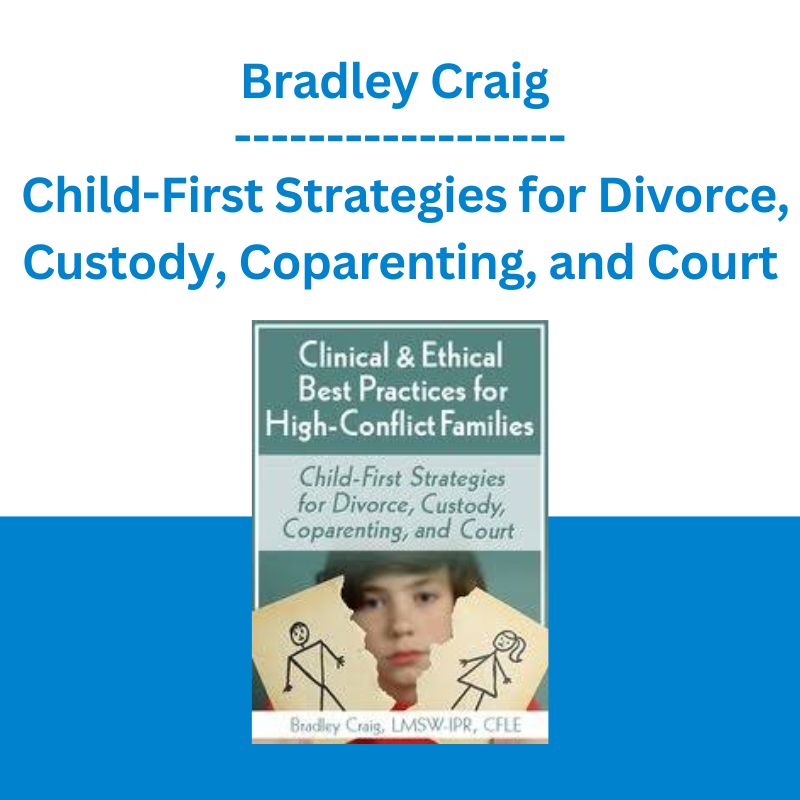*** Proof of Product ***
Exploring the Essential Features of “Bradley Craig – Clinical & Ethical Best Practices for High-Conflict Families: Child-First Strategies for Divorce, Custody, Coparenting, and Court”
Professionals in the mental health field commonly work with children and families in crisis. With over half of all marriages in the United States ending in divorce, mental health professionals frequently find themselves involved in these complex family structures. Well-meaning professionals can be negatively impacted by this involvement if they are unaware of the specialized issues that come with the dynamics of these families and the potential court interaction. Worse yet, this involvement can not only have long-term damaging effects on your professional credibility, but on these children and their families as well.
Presented by Bradley S. Craig, LMSW-IPR, CFLE, author of Between Two Homes: A Coparenting Handbook, this recording offers you the opportunity to familiarize yourself with the higher standard of practice involved in working with these families while learning about current research and knowledge regarding two-home issues. This recording will also discuss resources and parenting coordination tools available to these families.
Speaker
BRADLEY CRAIG, LMSW-IPR, CFLE, is a social worker, family life educator, and family law mediator in the North Texas area who has specialized in helping families work through divorce, custody, and coparenting issues for over 20 years. He is the author of Between Two Homes: A Coparenting Handbook, as well as numerous educational programs, videos, and curriculums designed to educate the public about the effects of parental conflict on children and the services available to help families through coparenting issues. Mr. Craig has conducted numerous trainings regarding clinical and forensic work with high-conflict families, covering topics such as family law mediation, parenting facilitation, coparent education, and child-first interventions, and he frequently speaks for state and national conferences and serves as an expert to the media.
Speaker Disclosures:
Financial: Bradley Craig maintains a private practice. He receives a speaking honorarium from PESI, Inc.
Non-financial: Bradley Craig has no relevant non-financial relationship to disclose.
Target Audience
- Psychiatrists
- Psychologists
- Social Workers
- Counselors
- Marriage and Family Therapists
- Alcoholism and Drug Abuse Counselors
- Case Managers
Objectives
- Outline the current professional and legal standards of practice between therapeutic and forensic services
- Describe how interventions can be adapted effectively for families in transition to maximize client outcomes
- Identify ethical considerations that arise when clients are involved with the family court system
- Illustrate circumstances where professional experience can be misapplied to families involved in the court system and identify ways to prevent this from happening
- Evaluate resources available to families that reduce chronic re-litigation and improve outcomes
- Define auxiliary professional roles with court connected cases including parenting coordination
Outline
Behind Closed Doors – An Inside Look at High-Conflict Family Dynamics
- What is coparenting?
- Recognizing where the family is
- The family in transition
- Vulnerability of the family
- Consequences for adults
- Children’s adjustment
- Best interest?
- Parentification
- Relocation
- The legal system
- Empowerment
- Terminology
- Resources and options for families
- Conflict addiction
Ethical Considerations for Clinical & Forensic Roles
- Dynamics of court involvement
- Guidelines for practice
- Therapeutic vs. forensic
- Defining roles
- Maintain your role
- Avoiding dual roles or multiple hat issues
- Treating with bias
Managing Risk From Day One
- Know your family code and licensing authority
- Why have a copy of orders?
- What to look for in orders
- Consent issues
- Forms and accessibility
- Intake
- Defining your client
- Goals
- If you are the child’s therapist…
- Reports
- This happened vs. client reports
- Who can you report on?
- But I’ve been ordered to…
Child-First Strategies for High-Conflict Families
- A parenting coordination model
- High-conflict behavioral patterns
- Labels: cooperative, high-conflict, and domestic violence
- Benefits and problems related to labels
- Things to recognize and tools to use
- Common parenting mistakes
- Cognitive work
- Boundary recognition
- The blame game
- Sympathy vs. empathy
- Cooperative vs. parallel vs. conflicted coparenting
- Alienation
- Estrangement
- Differentiating domestic violence
Please see the full list of alternative group-buy courses available here: https://lunacourse.com/shop/










 Money Miracle - George Angell - Use Other Peoples Money To Make You Rich
Money Miracle - George Angell - Use Other Peoples Money To Make You Rich